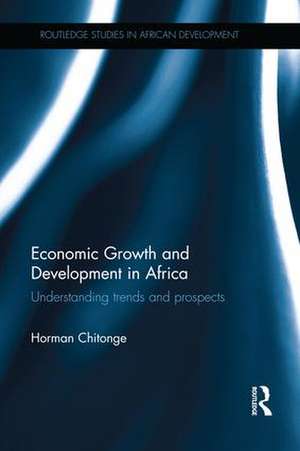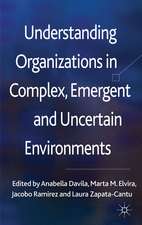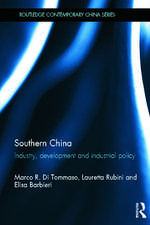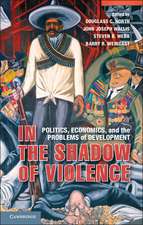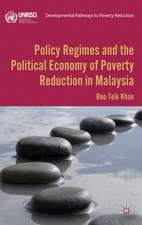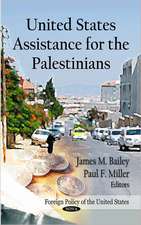Economic Growth and Development in Africa: Understanding trends and prospects: Routledge Studies in African Development
Autor Horman Chitongeen Limba Engleză Paperback – 26 aug 2016
Bringing in perspectives from African intellectuals and scholars, many of whom have previously been overlooked in this debate, the book examines the construction of Africa’s economic growth and development portraits over the years. It looks at two institutions that play a vital role in African development, providing a detailed explanation of how the World Bank and the IMF have interpreted and dealt with the African challenges and experiences. The insightful analysis reveals that if Africa is rising, only 20-30 per cent of Africans are aboard the rising ship, and the main challenge facing the continent today is to bring on board the majority of Africans who have been excluded from growth.
This book makes the complex, and sometimes confusing debates on Africa’s economic growth experience more accessible to a wide range of readers interested in the Africa story. It is essential reading for students and researchers in African Studies, and will be of great interest to scholars in Development Studies, Political Economy, and Development Economics.
| Toate formatele și edițiile | Preț | Express |
|---|---|---|
| Paperback (1) | 442.07 lei 6-8 săpt. | |
| Taylor & Francis – 26 aug 2016 | 442.07 lei 6-8 săpt. | |
| Hardback (1) | 1167.58 lei 6-8 săpt. | |
| Taylor & Francis – 15 ian 2015 | 1167.58 lei 6-8 săpt. |
Din seria Routledge Studies in African Development
-
 Preț: 348.19 lei
Preț: 348.19 lei -
 Preț: 284.45 lei
Preț: 284.45 lei -
 Preț: 318.10 lei
Preț: 318.10 lei -
 Preț: 238.37 lei
Preț: 238.37 lei - 14%
 Preț: 336.93 lei
Preț: 336.93 lei - 18%
 Preț: 1000.27 lei
Preț: 1000.27 lei -
 Preț: 390.80 lei
Preț: 390.80 lei -
 Preț: 386.00 lei
Preț: 386.00 lei - 18%
 Preț: 934.74 lei
Preț: 934.74 lei - 18%
 Preț: 1000.27 lei
Preț: 1000.27 lei - 18%
 Preț: 891.36 lei
Preț: 891.36 lei -
 Preț: 190.02 lei
Preț: 190.02 lei - 17%
 Preț: 267.77 lei
Preț: 267.77 lei - 9%
 Preț: 869.19 lei
Preț: 869.19 lei -
 Preț: 363.00 lei
Preț: 363.00 lei - 17%
 Preț: 258.50 lei
Preț: 258.50 lei -
 Preț: 443.65 lei
Preț: 443.65 lei -
 Preț: 479.63 lei
Preț: 479.63 lei - 18%
 Preț: 1054.71 lei
Preț: 1054.71 lei -
 Preț: 461.84 lei
Preț: 461.84 lei -
 Preț: 449.41 lei
Preț: 449.41 lei -
 Preț: 383.30 lei
Preț: 383.30 lei - 18%
 Preț: 1113.32 lei
Preț: 1113.32 lei - 20%
 Preț: 254.45 lei
Preț: 254.45 lei -
 Preț: 463.19 lei
Preț: 463.19 lei - 18%
 Preț: 997.11 lei
Preț: 997.11 lei - 17%
 Preț: 259.10 lei
Preț: 259.10 lei - 18%
 Preț: 1000.27 lei
Preț: 1000.27 lei -
 Preț: 488.29 lei
Preț: 488.29 lei -
 Preț: 186.53 lei
Preț: 186.53 lei - 18%
 Preț: 1000.27 lei
Preț: 1000.27 lei
Preț: 442.07 lei
Nou
Puncte Express: 663
Preț estimativ în valută:
84.59€ • 88.62$ • 70.11£
84.59€ • 88.62$ • 70.11£
Carte tipărită la comandă
Livrare economică 08-22 aprilie
Preluare comenzi: 021 569.72.76
Specificații
ISBN-13: 9781138226029
ISBN-10: 1138226025
Pagini: 314
Dimensiuni: 156 x 234 x 17 mm
Greutate: 0.28 kg
Ediția:1
Editura: Taylor & Francis
Colecția Routledge
Seria Routledge Studies in African Development
Locul publicării:Oxford, United Kingdom
ISBN-10: 1138226025
Pagini: 314
Dimensiuni: 156 x 234 x 17 mm
Greutate: 0.28 kg
Ediția:1
Editura: Taylor & Francis
Colecția Routledge
Seria Routledge Studies in African Development
Locul publicării:Oxford, United Kingdom
Public țintă
Postgraduate and UndergraduateCuprins
1. In Search of the 'Africa Dummy' 2. The World Bank and IMF in Africa: The Project Lending Era 3. The Bank and IMF in Africa: The SAPs and Beyond 4. Africa's Economic Growth Experience in Empirical Growth Studies 5. The State and Development in Africa 6. The Political Economy of Africa's Economic Growth and Development Experience 7. Africa Rising: Changing Fortunes or another 'False Start'? 8. African Intellectuals and the African Growth and Development Challenges
Recenzii
"Horman Chitonge’s impressive, wide-ranging and multidisciplinary account of Africa’s development challenges orthodox explanations of its position in the world and provides a fresh perspective to aid academics and practitioners, especially from the continent itself, who seek to understand its past and shape its future."
Peter Lawrence, Keele University, UK
"Chitonge challenges us to understand ‘the challenge itself’ – and that is to cast off the epistemological straitjackets that have constrained our approaches to Africa’s political economy for the past centuries. This book is an essential starting point for that process: read it, and go forward on Chitonge’s new paths."
David Moore, University of Johannesburg, South Africa
Peter Lawrence, Keele University, UK
"Chitonge challenges us to understand ‘the challenge itself’ – and that is to cast off the epistemological straitjackets that have constrained our approaches to Africa’s political economy for the past centuries. This book is an essential starting point for that process: read it, and go forward on Chitonge’s new paths."
David Moore, University of Johannesburg, South Africa
Descriere
This book analyses the accounts of Africa’s economic growth and development experiences, including the current Africa Rising Narrative, from multidisciplinary perspectives. It is a critical assessment of the explanations given for the widely acknowledged poor economic growth and development performance in Africa, prior to the 2000s. It uniquely tries to locate African intellectuals and scholars in the construction of Africa’s economic growth and development portraits over the years. It also provides a detailed analysis of how the World Bank and the IMF have interpreted and dealt with the African development challenges and experiences.
